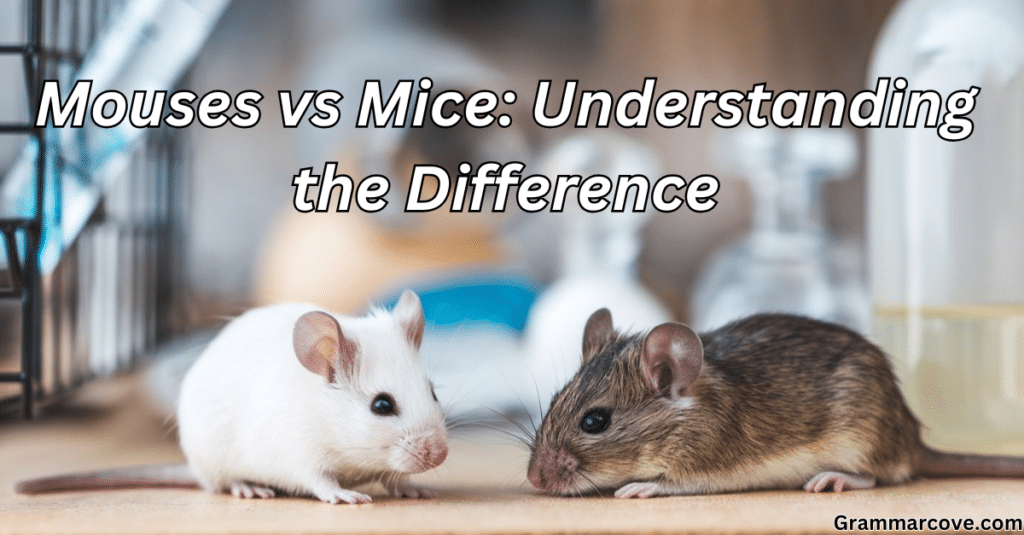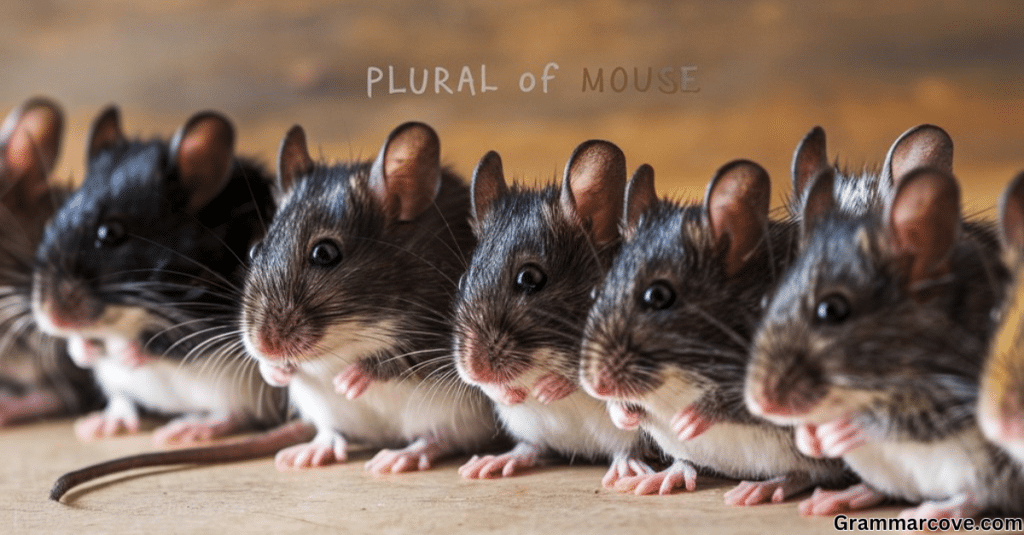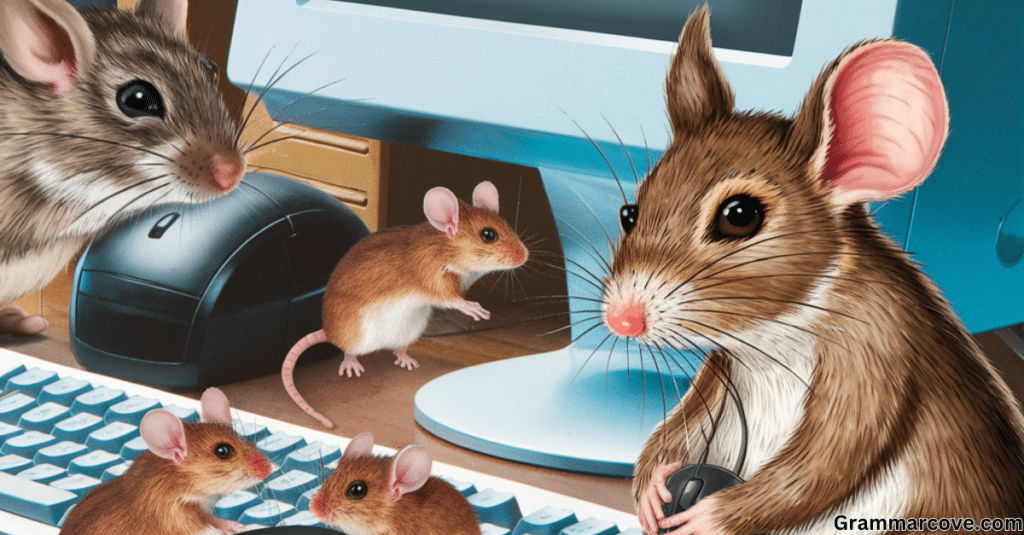English, with its rich history and peculiarities, is filled with challenges, especially when it comes to plural forms. One common confusion revolves around the word mouse—specifically, the plural form of the word. Mouses vs mice—which one is correct? When should you use mice, and when might mouses be appropriate?
Whether you’re talking about the small rodent that scurries through your attic or the essential device you use to control your computer, this seemingly simple word can create confusion.
In this article, we will explore the correct plural forms of the word mouse in different contexts, delve into some interesting linguistic history, and provide examples that clarify which form to use and when. We’ll also examine the subtle differences between mice and mouses in various settings. Let’s dive in!
Mouses vs Mice: Understanding the Difference

The plural of mouse can either be mice or mouses, but the context in which they are used determines which one is correct. Here’s a quick overview:
- Mice – The traditional plural form used when referring to the small rodent.
- Mouses – A plural form used in some cases when referring to the computer mouse, particularly when talking about more than one pointing device.
Scenario 1: The Plural of Mouse in the Context of Rodents
The word mouse has been around for centuries. Its plural, mice, is used exclusively when referring to the small rodent. Whether you’re talking about a single mouse or a group of them, mice is always the correct choice.
Example 1: Rodents in Your Home
Imagine you’re writing an email to a friend about a pest problem:
Subject: We Have Mice!
Hi Sarah,
You won’t believe what happened last night! I was sitting in the living room when I heard some rustling near the pantry. When I checked, I saw two mice darting around looking for crumbs. I can’t believe how fast they are!
I’m calling an exterminator today to get rid of these mice for good. Have you ever had a mouse infestation?
Talk to you soon,
Lisa
In this scenario, mice is used because you’re talking about the rodents that are often associated with household pests.
Scenario 2: The Plural of Mouse in the Context of Technology
The confusion begins when we start talking about the computer mouse—the pointing device. Here, mice is often used, but mouses is also commonly seen, particularly in informal contexts or technical writing.
While both forms are technically acceptable, mouses tends to appear more frequently when referring to multiple computer mice.
Example 2: Talking About Computer Mouses
Imagine you’re writing a work email to your colleague, discussing an office upgrade:
Subject: Need to Order More Mouses
Hey Mark,
I noticed that a few of the old mouses in the office are acting up. Some of them are unresponsive, and others have become really slow. Can you check with IT about ordering new mouses for the team?
Thanks,
Samantha
In this case, mouses is used because you are referring to multiple computer mice. It’s less about the traditional rodent and more about the office equipment.
Plural of Mouse: The Rules

Why Do We Use Mice for Rodents?
Mice as the plural of mouse follows the irregular plural rule. English is notorious for having irregular plural nouns that don’t follow the usual -s or -es pattern. Words like child/children, man/men, and tooth/teeth all follow their own rules. Mouse happens to follow the same pattern, with mice as its irregular plural.
The historical reason behind the mice form stems from Old English, where the plural of mouse was already mice. This form remained unchanged over the centuries.
When to Use Mouses for Computer Devices
On the other hand, the plural form mouses is a newer development in the English language. With the rise of personal computers in the 20th century, the need arose to refer to multiple computer mouses (or mice) in casual and technical contexts.
Although mice is widely used for both rodents and computer devices, mouses is preferred when referring to multiple computer devices in informal settings. Mouses appears to be a more intuitive form, following the general rule of adding -s to pluralize a noun.
Irregular Plural Nouns in English Grammar
The word mouse is part of a larger family of irregular plural nouns in English, where the plural form doesn’t follow the regular -s or -es pattern. Here’s a quick comparison of some irregular plural nouns:
| Singular Noun | Plural Noun |
|---|---|
| mouse | mice |
| goose | geese |
| child | children |
| tooth | teeth |
| ox | oxen |
| woman | women |
As you can see, the plural of mouse is one of the many irregular plural nouns that don’t follow typical pluralization rules.
Mouses vs Mice: Detailed Usage in Context

Let’s break down how mice and mouses are used in more detailed contexts, with some additional scenarios that will help clarify the differences between them.
Scenario 3: Writing About the Mouse Animal Plural
Imagine you’re writing a research paper on the behavior of small rodents:
Title: A Study of Rodent Behavior: Mice in Urban Areas
In urban areas, mice have adapted to living alongside humans. Their small size and ability to hide in tight spaces make them excellent survivors. Studies have shown that mice are particularly active during the fall, when food supplies begin to dwindle.
Researchers have also found that mice prefer to nest in warm, secluded areas, like attics and basements.
In this example, mice is the correct plural form because it’s discussing the rodent plural.
Scenario 4: Using the Term Mouses for Computers in an Email
Let’s now look at an example email where you’re discussing computer mouses with a colleague in a technical setting:
Subject: Upgrading to New Computer Mouses
Hi David,
I’ve noticed that several of our old mouses are no longer functioning correctly. Some are slow to respond, and others need to be cleaned more frequently. Could you look into getting mouses with better ergonomics for the entire team? A few of us have been dealing with wrist pain, and new mouses might help.
Thanks,
Jenna
In this example, mouses is used because it’s referring to computer mouses in a casual office setting. The -s ending makes it feel more like a regular noun than the irregular mice form.
Mice and Mouses in Different Contexts
Now that we’ve gone over basic usage, let’s consider mice for computer in greater detail. How do you decide whether to use mice or mouses in a technical context, especially when you’re dealing with multiple devices?
The Evolution of the Computer Mouse and Its Plural Form
The computer mouse has an interesting history. Originally invented by Douglas Engelbart in the early 1960s, the device was designed as a way to interact with computers using a pointing device. Over time, as the computer mouse became more ubiquitous, the plural form of mouse started to take shape.
Initially, mice was the only form used, simply because it was the familiar plural of mouse. However, as the term computer mouse became commonplace, mouses began to appear more often. Mouses was used informally in places where more than one computer mouse was being discussed.
Here’s an overview of some commonly accepted ways to refer to the plural of mouse in the context of technology:
| Context | Preferred Plural Form | Notes |
|---|---|---|
| Referring to rodents | Mice | Standard plural form of mouse. |
| Referring to computers | Mouses | Informal plural for multiple computer mice. |
| Formal technical writing | Mice | Generally preferred in formal or professional contexts. |
Mice vs Mouses: Conclusion
So, which is correct: mouses or mice? The answer is simple once you understand the context:
- Mice is the correct plural of mouse when referring to the rodent.
- Mouses is typically used when referring to computer mice, though mice can still be used in more formal or technical contexts.
In casual conversation or less formal writing, mouses may feel more natural when talking about multiple computer mice. However, mice is always appropriate when discussing the small, furry animal.
Ultimately, mouses vs mice comes down to context, but understanding the historical roots and modern usage will help you avoid confusion.
With this clear distinction in mind, you can confidently use mice or mouses depending on whether you’re talking about the rodent or the computer device!


